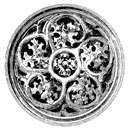
It’s Not the Episcopal Church Anymore
NEO-PAGANISM: OUT OF THE BROOM CLOSET
Anglo-Catholics within the Episcopal Church of the USA (ECUSA) have long claimed that Anglicanism is one of the three branches of Catholicism, along with Roman Catholicism and Eastern Orthodoxy. Yet the events at the ECUSA General Convention, held this year from July 5 through 14 in Denver, demonstrate — once again — that this claim is false.
ECUSA is firmly under the control of the apostles of a New Religion, a religion that is not at all Catholic, and Christian in name only. Defenders of traditional Christianity won no clear victories at the Convention, and suffered many defeats. Even more telling than the defeats on the Convention floor were the battles that were lost without any vote on a resolution. Some faithful Christians remain within ECUSA, but the institution — the House of Bishops, most other national and diocesan governing bodies, most seminaries, and most official Anglican publications — has chosen Baal over the Lord.
Here is the “body count” for orthodox, Catholic-minded Episcopalians as a result of the ECUSA Convention.
The following defeats occurred by vote of Convention:
– The Convention decided to continue the ongoing revision of the 1979 Book of Common Prayer (BCP). This is expected to take 12 years, and the new “book” is likely to be published on the Net and as a CD-ROM. The use of a single, hardcopy prayer book by the entire Church will end; each congregation will be free to create its own liturgy within the expansive limits of the 2012 BCP and the proposed “supplemental liturgies.” Liturgical innovators will be happy with this change; it will be more difficult for traditionalists to resist innovations if they cannot point to fixed texts and defined rubrics as the standard for worship in ECUSA.
You May Also Enjoy
Hopes for the full evangelization of Anglicans were dashed by a statement issued by, of all people, the Catholic bishops of England.
Many Anglicans breathed a deep sigh of relief when Archbishop Robert Runcie arrived at the…
Let Rome be Rome, and let the ecumenical chips fall where they may.

